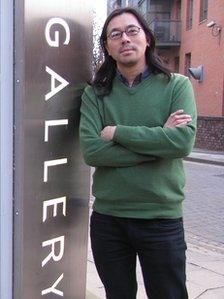Arts Council England cuts losers: One year on
- Published
A year ago, more than 200 theatre, art and other cultural organisations were told that they would be taken off the list of bodies receiving regular Arts Council England funding. They were given a year's notice and that money runs out this week.
So, how have they fared? Are they having to close, or have efforts to raise more money elsewhere allowed them to flourish without subsidy?
Northumberland Theatre Company

Northumberland Theatre Company's current show 4 Words has had help from the writer Val McDermid
The Northumberland Theatre Company (NTC), which has been taking plays to village halls and community centres for 20 years, has lost £337,000 of annual Arts Council income.
"The crucial thing that's kept us going and buoyed us up has been the support of our audiences and all the people that work with us," says artistic director Gillian Hambleton.
The company has been brainstorming to come up with new ways of rustling up cash.
The actors now explain the company's predicament to audiences after every show before bringing out a donations pot.
There is a new friends and family scheme, which audiences can pay to join, while prominent buttons on their website offer ways to donate.
One fan is crime writer Val McDermid, who has helped out by letting the company adapt her short stories for the stage for free and sell the books afterwards. One of her stories is part of NTC's current tour, 4 Words.
The company is putting its expertise to use in other ways - Hambleton is giving audition masterclasses to university students and actors are being seconded to the NHS for training exercises.
"We've not just been sitting on our laurels hoping somebody's going to give us some money," Hambleton says.
Ticket prices
But while the various fundraising schemes will help, there will still be a sizeable shortfall.
The company has had to cut its apprenticeship scheme for budding theatre workers.
Hambleton says the company has pared down its own running costs as far as possible, and cannot raise ticket prices or booking fees any further.
"We did a lot of research and our fees are the highest among comparable companies," she says. "So you can only raise things so far before people stop coming or stop booking you."
The NTC has bid for funds from a different Arts Council pot, the Strategic Touring Fund. They find out about that in April and their summer and autumn show, A Midsummer Night's Dream - and the future of the company - depends on it.
Northumberland Theatre Company's 4 Words completes its tour in Washington, Etal and Longhirst this week.
Kompany Malakhi, Bristol

Kwesi Johnson choreographed SoundClash. Photo: Brian Slater
Bristol-based dance group Kompany Malakhi closed two weeks ago after losing its £159,000-a-year grant.
Former artistic director Kwesi Johnson admits that they did not meet some of the Arts Council targets in relation to bringing in new audiences and different sources of income.
And he accepts that they are "quite within their rights" to withdraw their money if it is not achieving their aims.
"It's public money at the end of the day," he says.
So no complaints?
"If I complained it would be wasted energy," the choreographer says. "I'd rather put my energy into new ideas and in actual fact, it has brought about a completely different mindset."
Johnson did not try to replace the Arts Council money because applying to trusts, foundations and charities would have been pointless, he believes.
"They're not going to invest in something when they know it's going to have a massive chunk of its core funding withdrawn," he says.
"Trying to find alternative forms of funding was near impossible, so that's why we decided to close it in its current structure."
The company employed four people, with 12 freelancers looking after tasks like marketing and education work.
And the new mindset? Although the company has closed, Johnson says: "We've stopped doing it in the way we were doing it, we've not stopped doing it."
Not having the Arts Council's "restrictive" criteria to meet and boxes to tick has given him a new freedom, Johnson says.
"I feel like a recording artist being released from Sony or EMI or something like that."
He is planning new digital projects that do not revolve around making a show for theatres. And this time, he will look for commercial partners.
"I'm thinking more of investment, and investment is about making profit and about being able to make things exist rather than it being a charity," he says.
"So if we're talking about stuff to do with health, we might go to Bupa or Simply Health or companies like that.
"At the end of the day, the people that got cut, we're artists and we make things happen and we think creatively. And we just have to think creatively in another format. It's not the end of the world."
Kwesi Johnson's latest workSoundClash, external, presented by Phoenix Dance Theatre, can be seen in Bristol and Newcastle in May.
Writers In Prison Network

The Writers In Prison Network has not cut back on its 16 residencies this year
"It knocked us to the floor," says Writers In Prison co-director Clive Hopwood of the Arts Council decision to end its £154,000-a-year grant.
"Then we got angry - why us?" he continues. "Next we got up and went: 'Right, what can we do?'"
Writers In Prisons organises authors' residencies in jails across the UK in the belief that creative writing can help rehabilitation.
"We passionately believe in what we do," Hopwood says. "Passionately. And we can't let it go away. There is nobody else doing what we do. It was very, very important that we made sure that we're still here."
There were three options when the cuts were announced, Hopwood says.
"One is - you just give up. That wasn't on the cards. Another was to reduce ourselves to some little seed and survive under the permafrost for three or four years until light appears. That wouldn't work either because you're not really fulfilling what the organisation's about.
"So the other alternative was to do exactly the opposite and grow our way out of it."
Writers In Prison has not cut back on the number of residencies and is trying to branch out by offering workshops in related areas, such as probation or pupil referral units, in the hope of generating income from those activities.
"We will keep doing exactly what we're doing at the same level," Hopwood says. "We know there's a wall somewhere in the distance when we run out of money.
"But we thought if we hit the wall at 200mph, at least we've been doing our damnedest to survive."
The organisation has had a separate Arts Council subsidy to pay for staff to develop fundraising activities and new customers.
Apart from that, it also has enough money saved to keep going for another six months.
"We still have no guarantee that we're going to be here in six months' time but we're more confident that it can be done," Hopwood says.
Castlefield Gallery, Manchester

Castlefield director Kwong Lee says it must become more entrepreneurial
The Castlefield gallery, which specialises in showing emerging and experimental artists, lost its ongoing £92,000-a-year Arts Council grant.
Like the other two featured organisations that have also kept going, it has received money from a different Arts Council pot.
It has had a cheque for £98,000 for the next two years under the Grants For the Arts scheme, which gives money for set time periods.
That will keep the gallery going, but director Kwong Lee says the cut forced the gallery to re-examine its purpose. He has decided it must focus on its strengths and be "sharper" - acknowledging that it was a little fuzzy around the edges before.
"It's about looking at what we do best and doing those things better, but also making sure people know about them," he says.
Castlefield's unique selling point, he says, is "talent development" - giving promising artists their first proper exhibition or plugging them into the region's arts network.
As such, the gallery has gone back to all artists who have exhibited there in the past to ask for works to auction to raise funds. Those who have donated art include Turner Prize winner Mark Leckey, Rachel Goodyear, Pavel Buchler and Lubaina Himid.
The gallery will also try to make money by renting out office space and hosting corporate events, while staff expertise can be offered to companies wishing to hang art collections, or universities, Lee says.
"I think we're going to have to be much more entrepreneurial in terms of earning income and it will take a bit of time as well," he says.
- Published29 March 2012